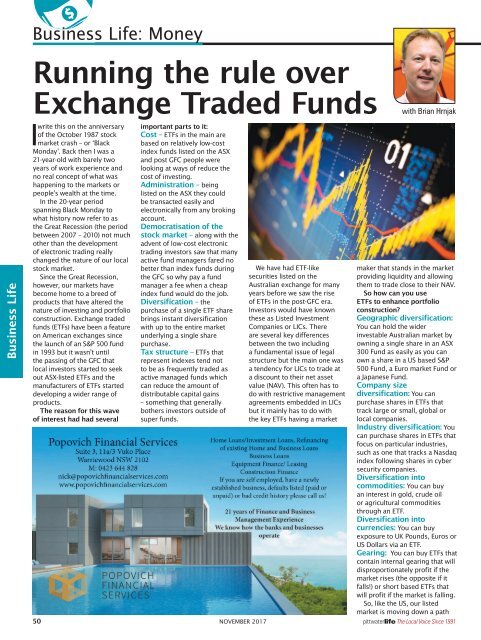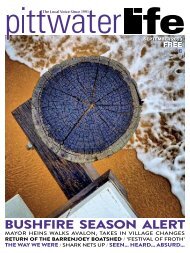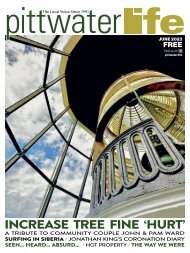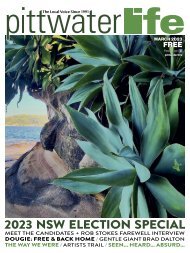Pittwater Life November 2017 Issue
5 Questions for the Mayor. Principal & Interest. A Loyal Commission. Market Value!
5 Questions for the Mayor. Principal & Interest. A Loyal Commission. Market Value!
You also want an ePaper? Increase the reach of your titles
YUMPU automatically turns print PDFs into web optimized ePapers that Google loves.
Business <strong>Life</strong>: Money<br />
Business <strong>Life</strong><br />
Running the rule over<br />
Exchange Traded Funds<br />
Iwrite this on the anniversary<br />
of the October 1987 stock<br />
market crash – or ‘Black<br />
Monday’. Back then I was a<br />
21-year-old with barely two<br />
years of work experience and<br />
no real concept of what was<br />
happening to the markets or<br />
people’s wealth at the time.<br />
In the 20-year period<br />
spanning Black Monday to<br />
what history now refer to as<br />
the Great Recession (the period<br />
between 2007 – 2010) not much<br />
other than the development<br />
of electronic trading really<br />
changed the nature of our local<br />
stock market.<br />
Since the Great Recession,<br />
however, our markets have<br />
become home to a breed of<br />
products that have altered the<br />
nature of investing and portfolio<br />
construction. Exchange traded<br />
funds (ETFs) have been a feature<br />
on American exchanges since<br />
the launch of an S&P 500 fund<br />
in 1993 but it wasn’t until<br />
the passing of the GFC that<br />
local investors started to seek<br />
out ASX-listed ETFs and the<br />
manufacturers of ETFs started<br />
developing a wider range of<br />
products.<br />
The reason for this wave<br />
of interest had had several<br />
important parts to it:<br />
Cost – ETFs in the main are<br />
based on relatively low-cost<br />
index funds listed on the ASX<br />
and post GFC people were<br />
looking at ways of reduce the<br />
cost of investing.<br />
Administration – being<br />
listed on the ASX they could<br />
be transacted easily and<br />
electronically from any broking<br />
account.<br />
Democratisation of the<br />
stock market – along with the<br />
advent of low-cost electronic<br />
trading investors saw that many<br />
active fund managers fared no<br />
better than index funds during<br />
the GFC so why pay a fund<br />
manager a fee when a cheap<br />
index fund would do the job.<br />
Diversification – the<br />
purchase of a single ETF share<br />
brings instant diversification<br />
with up to the entire market<br />
underlying a single share<br />
purchase.<br />
Tax structure – ETFs that<br />
represent indexes tend not<br />
to be as frequently traded as<br />
active managed funds which<br />
can reduce the amount of<br />
distributable capital gains<br />
– something that generally<br />
bothers investors outside of<br />
super funds.<br />
We have had ETF-like<br />
securities listed on the<br />
Australian exchange for many<br />
years before we saw the rise<br />
of ETFs in the post-GFC era.<br />
Investors would have known<br />
these as Listed Investment<br />
Companies or LICs. There<br />
are several key differences<br />
between the two including<br />
a fundamental issue of legal<br />
structure but the main one was<br />
a tendency for LICs to trade at<br />
a discount to their net asset<br />
value (NAV). This often has to<br />
do with restrictive management<br />
agreements embedded in LICs<br />
but it mainly has to do with<br />
the key ETFs having a market<br />
with Brian Hrnjak<br />
maker that stands in the market<br />
providing liquidity and allowing<br />
them to trade close to their NAV.<br />
So how can you use<br />
ETFs to enhance portfolio<br />
construction?<br />
Geographic diversification:<br />
You can hold the wider<br />
investable Australian market by<br />
owning a single share in an ASX<br />
300 Fund as easily as you can<br />
own a share in a US based S&P<br />
500 Fund, a Euro market Fund or<br />
a Japanese Fund.<br />
Company size<br />
diversification: You can<br />
purchase shares in ETFs that<br />
track large or small, global or<br />
local companies.<br />
Industry diversification: You<br />
can purchase shares in ETFs that<br />
focus on particular industries,<br />
such as one that tracks a Nasdaq<br />
index following shares in cyber<br />
security companies.<br />
Diversification into<br />
commodities: You can buy<br />
an interest in gold, crude oil<br />
or agricultural commodities<br />
through an ETF.<br />
Diversification into<br />
currencies: You can buy<br />
exposure to UK Pounds, Euros or<br />
US Dollars via an ETF.<br />
Gearing: You can buy ETFs that<br />
contain internal gearing that will<br />
disproportionately profit if the<br />
market rises (the opposite if it<br />
falls!) or short based ETFs that<br />
will profit if the market is falling.<br />
So, like the US, our listed<br />
market is moving down a path<br />
50 NOVEMBER <strong>2017</strong><br />
The Local Voice Since 1991

















